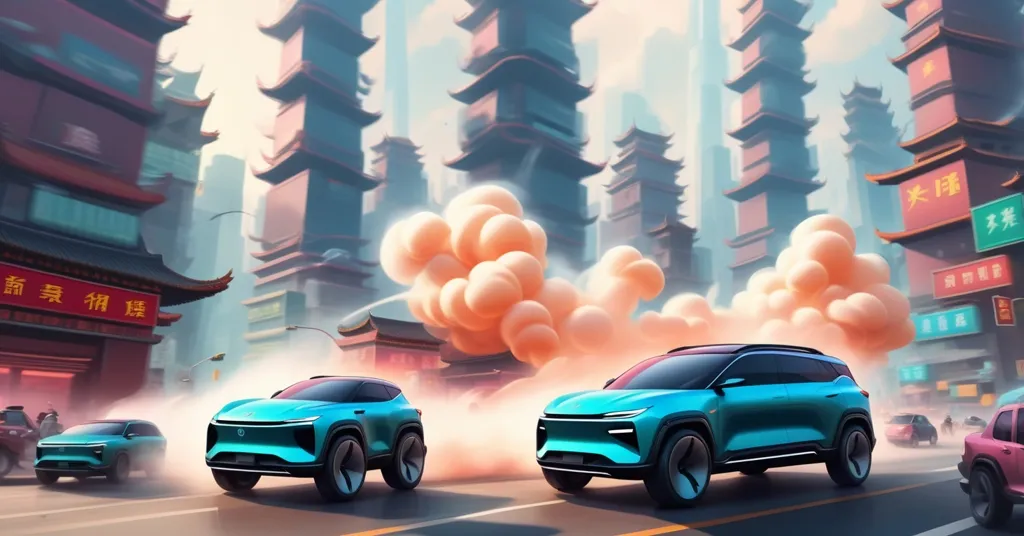Xiaomi YU7 Electric SUV: Massive Orders, Delivery Delays Challenge EV Ambitions

Xiaomi’s YU7 Electric SUV: A Tech Titan’s Bold Leap Faces Delivery Hurdles
Xiaomi Corp., a heavyweight in the smartphone and gadget world, has charged into the electric vehicle (EV) race with its YU7 electric SUV, delivering over 40,000 units since its launch on July 6. But with a staggering 289,000 orders in the first hour, the Chinese tech giant is wrestling with delivery delays that could dampen the initial hype in one of the most cutthroat EV markets on the planet.
- Launch Success: Over 40,000 YU7 units delivered in two months since July 6.
- Demand Overload: 289,000 orders in the first hour, with 240,000 confirmed in 18 hours.
- Delivery Struggles: Wait times still at 45–48 weeks, testing customer patience.
Record-Breaking Launch Turns Heads in China’s EV Market
The YU7’s debut was nothing short of a blockbuster. Within just an hour of unveiling, Xiaomi racked up 289,000 orders, ballooning to over 240,000 confirmed reservations—most backed by deposits—within 18 hours. That kind of frenzy signals a deep hunger for an affordable, tech-loaded electric SUV in China, where consumers are spoiled for choice but always hunting for value. Priced at a base of 253,500 yuan (roughly $34,900), the YU7 undercuts Tesla’s Model Y by a noticeable margin, making it a direct shot across the bow of one of the biggest names in the EV game. For more on Xiaomi’s challenges with this launch, check out the detailed coverage on their YU7 electric SUV delivery hurdles and local competition.
For those new to the EV space, the Model Y is Tesla’s compact SUV, a bestseller in China thanks to its range, performance, and brand cachet. Xiaomi’s strategy is clear: offer comparable specs—think range, smart features, and sleek design—at a price that doesn’t break the bank. In August, Xiaomi shipped 16,548 YU7 units, nearly tripling July’s numbers, while their total monthly deliveries, including the earlier SU7 sedan, topped 30,000. Analysts from Goldman Sachs project Xiaomi could hit a weekly production rate of 10,000 units soon, a remarkable pace for a company that’s a newcomer to building cars.
But let’s not get carried away with the fanfare. Behind these dazzling stats lies a gritty reality of production bottlenecks and frustrated buyers. A quick peek at platforms like Weibo, China’s answer to X, reveals a mixed bag—excitement over the YU7’s price tag, but palpable irritation at waiting nearly a year to get behind the wheel. That’s long enough to binge every car show on streaming platforms and still have time to daydream about your yet-to-arrive ride.
Delivery Delays: A Rookie’s Growing Pain
The harsh truth? If you order a YU7 today, you’re looking at a 45–48 week wait, down slightly from 56–59 weeks last month. That’s almost a full calendar year after dropping a deposit, a bitter pill for eager customers. Xiaomi’s CEO, Lei Jun, has faced this head-on, admitting the disconnect between demand and supply.
“There is a large gap between orders and deliveries, and we are committed to accelerating output to close it.”
Why the delay? Building an SUV like the YU7 isn’t as simple as churning out smartphones. It’s a larger, more intricate beast compared to Xiaomi’s first EV, the SU7 sedan, with complex systems like advanced battery packs and safety tech that take time to assemble. The first 100,000 units alone took 230 days to produce. Throw in global supply chain chaos—think shortages of semiconductors, the tiny chips that power everything from navigation to brakes, and lithium-ion batteries that are the heart of any EV—and you’ve got a perfect storm of delays. These issues aren’t unique to Xiaomi; they’ve plagued the auto industry since the pandemic, but for a rookie, the pressure to scale fast without screwing up quality is immense.
Xiaomi isn’t sitting idle. They’re pouring resources into automation, forging ties with suppliers to secure critical components, and pushing to ramp up factory output. But balancing speed with reliability is a high-wire act. Rush too hard, and you risk shipping lemons; lag behind, and you lose the buzz that’s fueling your rise.
Competing with Giants: Tesla, BYD, and the Price War
China’s EV market isn’t a sandbox for beginners—it’s a gladiator arena. Xiaomi is squaring up against titans like BYD, which sold over 340,000 EVs in Q2 2023 alone and controls much of its own battery production, giving it a brutal cost edge. Then there’s Nio, a premium EV brand with a cult-like following, and Tesla, which has slashed Model Y prices in China to as low as 249,900 yuan after subsidies in some periods, flexing its muscle to fend off upstarts. Xiaomi’s YU7, with its aggressive pricing, is a calculated jab at Tesla, but price wars cut both ways. Can they maintain profitability if Tesla or BYD swing back with deeper discounts?
Let’s not forget Xiaomi’s roots. As a tech company, they bring software smarts and hardware know-how to the table, areas where traditional automakers often stumble. The YU7 isn’t just a car; it’s a connected device on wheels, likely packed with over-the-air updates, smart dashboards, and integration with Xiaomi’s ecosystem of gadgets. While specific details on range (rumored around 500-600 km per charge) and autonomous driving features are still trickling out, their tech DNA could be a differentiator—assuming they don’t trip over manufacturing hurdles first.
A Tech Titan’s Gamble: Innovation Meets Reality
Xiaomi’s jump from smartphones to EVs mirrors a wider trend of tech firms disrupting old-school industries, much like how Bitcoin and blockchain have rattled legacy finance. Their expertise in the Internet of Things (IoT)—basically, making everyday devices talk to each other—positions them to build “smart” vehicles that could redefine the driving experience. Imagine a car that syncs seamlessly with your home automation or learns your habits via AI. That’s the kind of edge Xiaomi might wield.
But here’s the devil’s advocate angle: Is the YU7’s low price a trap? In the crypto world, we’ve seen countless projects promise the moon with cheap tokens, only to collapse under shoddy execution. Could Xiaomi’s rush to undercut competitors lead to corner-cutting on quality? A single recall or wave of complaints could tank the goodwill they’ve built. And while their order numbers are staggering, converting hype into long-term loyalty in a market that chews up newcomers is no small task.
Looking broader, China’s EV boom is fueled by government incentives for green transport and a consumer base eager for sustainable options. Yet supply chain snarls aren’t going away overnight. Battery giants like CATL, a key supplier in China, are stretched thin across the industry. Whether Xiaomi can lock in steady partnerships or innovate around constraints—perhaps by exploring alternative battery tech—will be critical.
Could Blockchain or Crypto Play a Role?
While the YU7 story isn’t directly tied to Bitcoin or decentralized tech, there’s room to speculate on intersections. Could blockchain-based supply chain tracking help Xiaomi untangle its component sourcing mess by offering transparent, tamper-proof records of where parts come from and when they’ll arrive? Or might they follow Tesla’s short-lived experiment by accepting crypto payments for deposits, tapping into a niche but growing pool of digital asset holders? Even further out, imagine EVs like the YU7 integrating with decentralized energy grids, trading surplus battery power via blockchain protocols. It’s a long shot, but tech firms like Xiaomi are exactly the type to push such boundaries.
What’s Next for Xiaomi in the EV Race?
Xiaomi’s YU7 launch is a bold statement—they’re here to play, and they’ve got the demand to prove it. Clocking over 40,000 deliveries in two months and becoming one of China’s fastest-growing EV makers is no fluke. But the road ahead is a gauntlet. If Lei Jun and crew can slash those wait times, keep quality tight, and navigate the price wars with giants like Tesla and BYD, they might just carve out a lasting spot in the market. If not, well, let’s just say China’s EV graveyard is already littered with wannabes who couldn’t keep up.
From a bigger picture, Xiaomi’s pivot to EVs underscores how tech companies are storming into spaces ripe for disruption, much like decentralized systems challenge centralized power. Whether they succeed or stumble, their gamble is a hell of a spectacle—and one worth watching as closely as the next Bitcoin halving.
Key Questions and Takeaways
- How successful is Xiaomi’s YU7 launch in the China EV market?
Massively successful on paper, with over 40,000 units delivered since July 6 and 289,000 orders in the first hour, but delivery delays of 45–48 weeks show a gap between demand and execution. - Can Xiaomi stand up to EV giants like Tesla and BYD?
Their aggressive pricing at 253,500 yuan ($34,900) and rapid delivery growth make them a contender, but production challenges and fierce competition from deep-pocketed rivals pose serious risks. - What are the main obstacles to Xiaomi’s EV ambitions?
Production bottlenecks, global shortages of semiconductors and batteries, and the risk of quality issues while scaling up could undermine customer trust and market momentum. - Could blockchain or crypto tech intersect with Xiaomi’s EV push?
Potentially, through supply chain transparency via blockchain or accepting crypto payments for orders, mirroring past Tesla moves, though it’s speculative at this stage. - Is Xiaomi’s low-price strategy sustainable long-term?
Undercutting Tesla’s Model Y is a bold play, but profitability could suffer if price wars escalate or production costs don’t stabilize, risking a race to the bottom.



